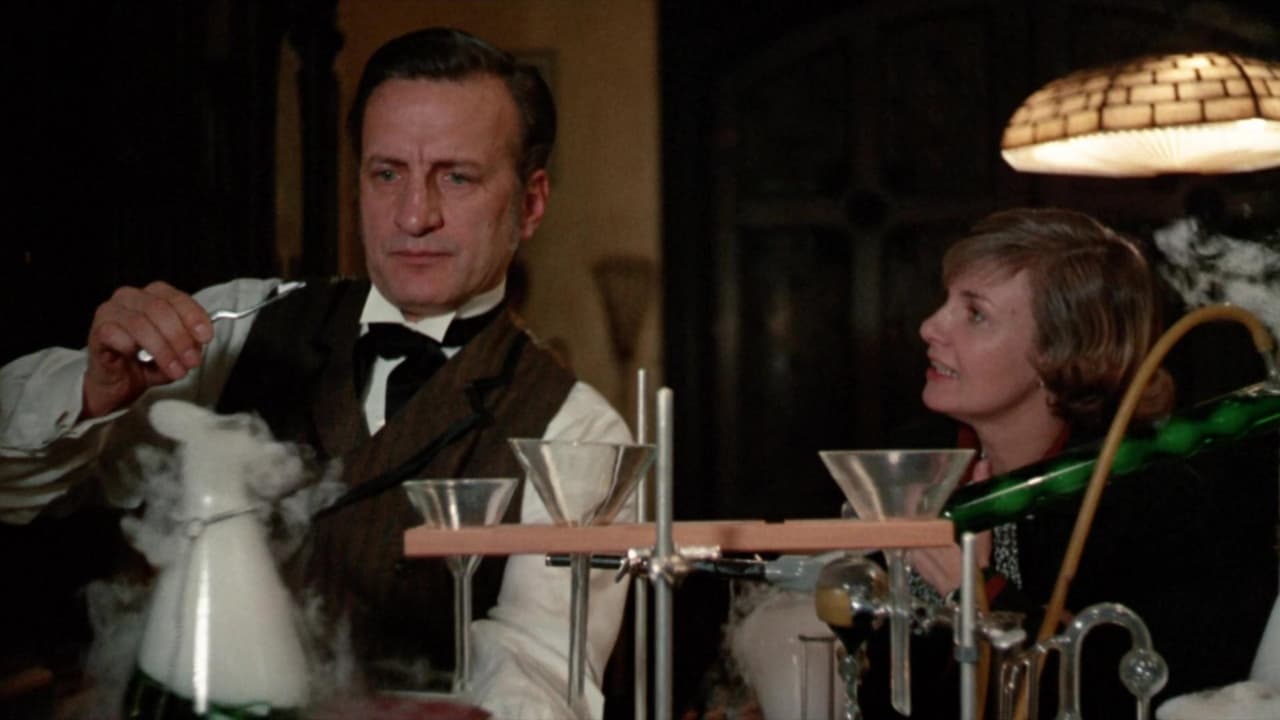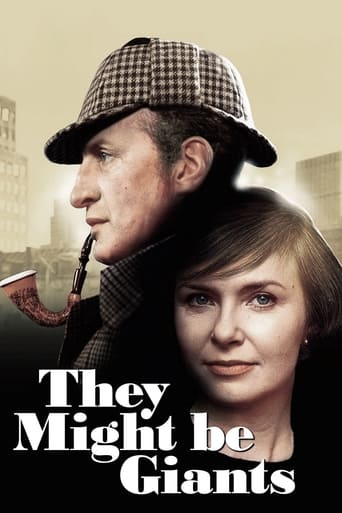

George C Scott is Justin Playfair who has believed himself to be Sherlock Holmes since the death of his wife, his brother wants to section him so to get his hands on the money Justin controls. Enter psychiatric doctor Mildred Watson....Effectively a companion piece to another James Goldman scripted romantic light drama Robin and Marian (1976) They Might Be Giants is a quirky story about loners, the lonely and love. Scott and Joanne Woodward (as Dr Watson) are both terrific esp in the later scenes as the relationship moves to the personal and Watson gives up her rational self for love and imagination.There is simply no way any major studio would make a film of this nature with the equivalent actors (if you could find them!) in 2015. Its too offbeat, too obtuse though one could imagine the best of cable channels giving this type of material a chance.Wiki notes the film is available in a couple of different edits - the version I saw on More4 (UK) was the 88 minute edit with the full supermarket scene included in a later version missing.
... View MoreThe film begins in the present time. Scott plays an ex-judge who loses his mind and now believes he is Sherlock Holmes. His greedy brother is bent on having him institutionalized--then he can have access to Scott's fortune. To get him hospitalized, they have him see a psychiatrist (Woodward)--but she is not about to just stick him in an institution. She wants to do a thorough job investigating and decides to go to Scott's home to meet him. But, he's not about to sit still--there is a crime to investigate. And, when he learns that her name is 'Dr. Watson', he KNOWS it's time to act. Along the way, they meet lots of nice misfits and have a grand adventure."They Might Be Giants" is a frustrating film. On one hand, George C. Scott has one of his most charming and enjoyable performances. In addition, the basic idea for the movie is quite promising. BUT, on the other hand, the film seemed to have no idea what to do with the plot--and it eventually degenerated into a stupid mess. And, to make things worse, the ending is just awful--and makes you wonder why you spent your time watching--and why two illustrious actors (Scott and Joanne Woodward) would be in such a flawed project. Having attendants from the local mental institution running about with giant nets and rubber hoses(!) and the god-awful grocery store scene stand out in my mind...and not for good reasons! A mess of a film--especially since the first half is so entertaining.
... View MoreRetired judge, living with his brother and sister-in-law in New York City, assumes the identity of Sherlock Holmes; his scheming sibling hopes to have him institutionalized and collect on his savings, until a lady psychologist (named Dr. Watson) gets involved with the judge...in more ways than one. "They Might Be Giants" wants (rather desperately, I think) to defy all the conventions of general storytelling. Screenwriter James Goldman, adapting his own play, begins the piece as a quirky character study (which might have worked), turning the material at the midway point into a half-comic/half-despairing romantic story (which might also have been successful). What we eventually get with the picture is an entangled mass of semi-realized loose ends--and dissatisfaction upon discovering the movie isn't going to do anything significant with its ingredients. George C. Scott and Joanne Woodward are both marvelous in their roles, giving Master Class-styled performances which go a long way to making the film watchable. Unfortunately, the sleuthing is existential, the funny people who meet up with the couple are just eccentric wallpaper, and the comedy ideas fizzle without solutions. Goldman does not want to be purposeful, or practical, or (God knows) commercial--but when so much is riding on making the romance between Scott and Woodward come off, you would think Goldman could follow through of some of his bigger concepts and round off the excesses. Filmed in NYC in the wintertime, the movie is also dark and chilly. Jack Gilford has a sweet monologue wishing he were the Scarlet Pimpernel, Woodward's cooking/dressing sequence is very funny, and Scott--when he smiles easily (without the devilishness)--is a handsome and gregarious rogue. But, sadly, not much is done with these intriguing characters. The film is a writer's conceit. ** from ****
... View MoreHow likely is a whimsical romance between a classic, delusional paranoid and his doctor? Perhaps not likely, unless the paranoid is Justin Playfair, who since his wife died two years previously believes he is Sherlock Holmes (George C. Scott), and the psychiatrist hired to commit him for life to an insane asylum, who is named Dr. Mildred Watson (Joanne Woodward). The movie sounds too cute for words, but is in fact a witty, clever look at how solitary people can find all kinds of strength and affection when they come together. Well, that's true for most of the movie. There are two weaknesses, one minor and one major, to deal with before Holmes and Dr. Watson prepare themselves for their meeting with Moriarty. Playfair was an astute and wealthy New York judge, noted for his analytical mind and dedication to justice. When his wife died he descended into paranoia. Now he is Sherlock Holmes, obsessed with finding the evil genius Moriarty. He dresses like Holmes, sounds faintly British and possesses an acute eye for analysis. "Half the trick in finding clues is knowing that they're there," he says. He is superb at finding clues everyone else misses. His younger brother, Blevins Playfair, is determined to have him committed to an insane asylum. Not because Holmes is a danger to anyone, but because Blevins is in debt to criminals. With Holmes institutionalized, Blevins will control the family fortune. The criminals believe that simply shooting Holmes would be a far quicker way to insure that Blevins gets the money to pay them back. Dr. Watson is the one person who must sign the documents to put Holmes away. She's not going to do this until she can examine him. The last thing Blevins wants is for Watson to think Holmes can be cured. "You don't think he can be, do you?" Blevins asks Watson. "Cure a classic? Once in a generation. It's a marvelous disease, you know. The victim's faculties grow keener and ultra-sensitive...and he's capable of things that seem like genius." Before long, however, Holmes is on the trail of Moriarty and Watson must follow along if she's going to fully diagnosis her patient. In the process, Holmes finds a grudging respect for Watson. He's been waiting for his Watson for a long time and is prepared to accept the fact that this Dr. Watson is a woman. "If I'm such a liability," she tells him with acerbity, "what do you want me for?" Holmes looks at her in a mildly friendly way. "Oh, you mustn't feel inferior. Try saying to yourself, 'I'm adequate.'" Mildred Watson, a slightly dowdy woman with a messy apartment who can't cook, is finally drawn to Holmes' integrity and passion. Will this be love? In an odd sort of way, yes, it will be. As Holmes pursues Moriarty's clues throughout New York City, he and Watson encounter a number of engaging misfits, lonely people and eccentrics. It all works until we get to the first bump in the road...that minor weakness. Taken one at a time, the eccentrics make for engaging and touching vignettes. Put all the eccentrics together, marching purposefully behind Watson and Holmes down a dark street and then rescuing the two from the police in a huge, empty supermarket, and we come dangerously close to the whimsical cutes. Then we must deal with a major question, and we encounter the major weakness. How will the movie end? Each one who sees the movie will most likely find their own answer. Perhaps that was the author's and director's intention. For me, I can't help but think that they simply couldn't come up with an effective conclusion based on the plot they had developed. Since I had come to like Holmes and Watson so much, I was left with wanting a conclusion I could smile at. What I was left with was a head scratch. Scott and Woodward do marvelous jobs in creating two lonely characters we begin to root for. As actors, they were worth every penny they were paid. For lessons in star quality and acting skill, pay close attention to Scott as he teases out of a mute patient why the man doesn't speak, and later to Woodward as she prepares a dinner for Holmes in her apartment. For a lesson in team acting by two equally matched pros, watch Holmes and Watson realize how they feel about each other at Watson's apartment. Scattered throughout the movie are some fine actors playing the eccentrics and assorted other characters, a few so quickly seen they're easily lost. Some to look for include Jack Gilford, Eugene Roche, Al Lewis, James Tolkan, F. Murray Abraham, M. Emmet Walsh, Rue McLanahan, Staats Cotsworth (of Casey, Crime Photographer fame on radio), Kitty Winn and Worthington Minor. He was the producer a long time ago behind Studio One when television every week presented live drama. They Might Be Giants is a fine movie. It's well worth watching for the skilled characterizations by two star actors and for an excellent script. While I might find the last ten minutes a bit unsatisfying, Sherlock Holmes and Mildred Watson are still worth believing in. As Holmes says as he and Watson stand together looking into the dark, "We're coming for you, Moriarty. We may not look like much. We may not have your weapons. We may lack your dark allies. Why, we may even lose...I'm not invincible. But together, sir, we may surprise you!"
... View More